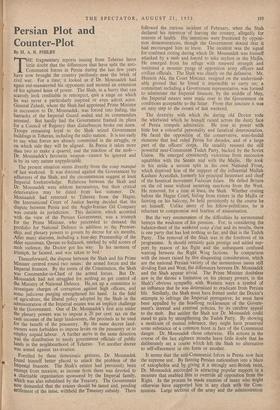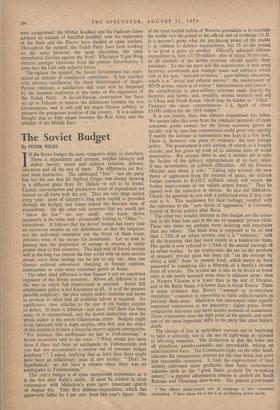Persian Plot and Counter-Plot
By H. A. R. PHILBY TETE fragmentary reports issuing from Teheran leave little .doubt that the differences that have split the anti- Communist forces in Persia during the last few years have now brought the country perilously near the brink of civil war. For a time, it looked as if Dr. Moussadek had again out-manoeuvred his opponents and secured an extension of his agitated lease of power. The Shah, in a hurry that can scarcely look creditable in retrospect, quit a stage on which he was never a particularly inspired or even adroit actor. General Zahedi, whom the Shah had appointed Prime Minister in succession to Dr. Moussadek, was forced into hiding, the barracks of the Imperial Guard sealed and its commanders arrested. But hardly had the Government fraMed its plans for a Council of Regency than disturbances broke out anew. Troops remaining loyal to the Shah seized Government buildings in Teheran, including the radio station. It is too early to say what forces are already committed in the struggle, or on which side they will be aligned. In Persia it takes more than two to make a quarrel, and the reaction of the mob— Dr. Moussadek's favourite weapon—cannot be ignored and is by its very nature unpredictable.
The present situation stems directly from the coup manqué of last weekend. It was directed against the Government by adherents of the Shah, and the circumstances suggest at least Imperial foreknowledge. Relations between the Shah and Dr. Moussadek were seldom harmonious, but their critical deterioration may be dated from last summer. Dr. Mmissadek had returned to Teheran from the Hague, the International Court of Justice having decided that the dispute between Persia and the Anglo-Iranian Oil Company was outside its jurisdiction. This decision, which accorded With the view of the Persian Government, was a triumph for the Prime Minister, who proceeded to demand the portfolio for National Defence in addition to the Premier- ship, and plenary powers to govern by decree for six months. After many alarums, including a four-day Premiership of the elder statesman, Qavam es-Sultaneh, marked by wild scenes of mob' violence, the Doctor got his way. In his moment of triumph, he fainted, and was taken to bed..
Thenceforward, the dispute between the Shah and his Prime Minister centred round two issues : the armed forces and the Imperial finances. By the terms of the Constitution, the Shah was Commander-in-Chief of the armed forces. But Dr. Moussadek had not struggled for nothing ,to get control of the Ministry of National Defence. He, set up .a committee to investigate charges of corruption against high officers, and some judicious purging strengthened his hand. In the field of agriculture, the liberal policy adopted by the Shah in the administration of the Imperial estates was an implicit challenge tO the Government. One of Dr.. Moussadek's first acts under the plenary powers was to impose a 20 per cent. tax on the cash incomes of the large landowners, the proCeeds to be used for the benefit of the peasantry. By the same decree land- owners were forbidden to impose levies on the peasantry or to employ unpaid labour. A further move in the same direction Was the distribution to needy government officials of public lands in the neighbourhoOd of Teheran. Yet another decree was aimed against tax-evasion.
Fortified by these democratic gestures, Dr. Moussadek found himself better placed to attack the problem of the Imperial finances. The Shah's estates had previously been exempt from taxation, as income from them was devoted to a charitable organisation sponsored by the Imperial family, Which was also subsidised by the Treasury. The Government now demanded that the estates should be taxed and, pending Settlement of the issue, withheld the Treasury subsidy. There followed the curious incident of February, when the Sbah declared his intention of leaving the country, allegedly for reasons of health. His intentions were frustrated by opposi- tion demonstrations, though the Government denied that it had encouraged him to leave. The incident was the signal for confused rioting during which Dr. Moussadek was himself attacked by a mob and forced to take asylum in the Majlis. He emerged from his refuge with renewed strength and instituted a monster purge of opposition army officers and civilian officials. The Shah was clearly on the defensive. Mr. Hussein Ala, the Court Minister, resigned on the understand- able ground that he found it impossible to carry on; a committee; including a Government representative, was formed to administer the Imperial finances; by the middle of May, the Imperial estates were made over to the Government on conditions acceptable to the latter. From that juncture it was an easy step to the events of last weekend.
The dexterity with which the daring old Doctor rode the whirlwind which he himself raised across the dusty face of Persia compels admiration. He rose to power with little but a colourful personality and fanatical determination. He faced the opposition of the conservative, semi-feudal elements that had ruled Persia for decades, and of a large part of the officers' corps. He steadily resisted the still powerful near-Communist Tudeh Party, backed by the Soviet Union. He emerged consistently victorious from successive squabbles with the Senate and with the Majlis. He took in his stride a serious split in his own National Front, which deprived him of the support of the influential Mullah Kashani' Ayatullah, formerly his principal lieutenant and chief of the fanatical movement Fadayan Islam. He defied Britain on, the oil issue without incurring sanctions from the West. He removed, for a time at least, the Shah. Whether orating before the Hague Court, hiding from rioters in the Majlis or fainting on his balcony, he held persistently to the course he set himself. Unlike many of his fellow-politicians, he is reluctant to compromise and fearless of assassination.
But the very enumeration of the difficulties he surmounted betrays the weakness of his position.. For, in considering the balance-sheet of the weekend coup d'etat and its results, there is one party that has lost nothing so far, and that is the Tudeh Party. The removal of the Shah was in the forefront of its programme. It should certainly gain prestige and added sup- port by reason of his flight and the subsequent confused warring between the Right Wing factions. In comparison with the issues raised by this disquieting consideration, which are the national Persian variety of the momentous issues still dividing East and West, the differences between Dr. Moussadek and the Shah appear trivial. The Prime Minister doubtless saw in the throne a limitation on his plenary powers, in the Shah's* obvious sympathy with Western ways a symbol of an influence that he was determined to eradicate from Persian' life. Similarly, the Shah must have fretted under the Doctor's attempts to infringe the Imperial prerogative; he must have been appalled by the headlong recklessness of the Govern- ment's internal and external policies, by its carefree appeal to the mob. But neither the Shah nor Dr. Moussadek could stand to gain by strengthening the Tudeh Party. By showing a modicum of mutual tolerance, they might have preserved some substance of a common front in face of the Communist danger. Dr. Moussadek chose otherwise. His actions in the course of the last eighteen months leave little doubt that he deliberately set a course which left the Shah no alternative to self-effacement in one form or another.
It seems that the anti-Communist forces in Persia now face the supreme test. By fanning Persian nationalism into a blaze of xenophobia and by giving it a strongly anti-British twist, Dr. Moussadek succeeded in attracting popular support in a measure that enabled him to override all opposition from the Right. In the process he made enemies of many who might otherwise have supported him in any clash with the Com- munists. Large sections of the army and the administration were antagonised; the Mullah Kashani and his Fadayan Islam adopted an attitude of watchful hostility; now the supporters of the Shah and the Doctor have clashed in open warfare. Throughout the turmoil, the Tudeh Party have been working on the same passions, the same discontent, the same xenophobia directed against the West. Whichever Right Wing element emerges victorious from the present disturbances, it must face the Left with reduced forces. Throughout the turmoil, the Soviet Government has main- tained an attitude of complacent correctness. It has watched with obvious satisfaction the sharp deterioraticin of Anglo- Persian relations, a satisfaction that must now be deepened by the hopeless confusion in the ranks of the opponents of the Tudeh Party. A Soviet-Persian commission has been set up in Teheran to remove the differences between the two Governments, and it will call for much Persian subtlety to preserve.the precarious position of the country. It is a solemn thought that so little stands between the Red Army and the oilfields of the Middle East.



























 Previous page
Previous page